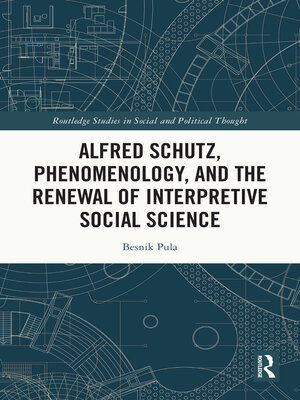Alfred Schutz, Phenomenology, and the Renewal of Interpretive Social Science
ebook ∣ Routledge Studies in Social and Political Thought
By Besnik Pula

Sign up to save your library
With an OverDrive account, you can save your favorite libraries for at-a-glance information about availability. Find out more about OverDrive accounts.
Find this title in Libby, the library reading app by OverDrive.



Search for a digital library with this title
Title found at these libraries:
| Library Name | Distance |
|---|---|
| Loading... |
In recent decades, the historical social sciences have moved away from deterministic perspectives and increasingly embraced the interpretive analysis of historical process and social and political change. This shift has enriched the field but also led to a deadlock regarding the meaning and status of subjective knowledge. Cultural interpretivists struggle to incorporate subjective experience and the body into their understanding of social reality. In the early twentieth century, philosopher Alfred Schutz grappled with this very issue. Drawing on Edmund Husserl's phenomenology and Max Weber's historical sociology, Schutz pioneered the interpretive analysis of social life from an embodied perspective. However, the recent interpretivist turn, influenced by linguistic philosophies, discourse theory, and poststructuralism, has overlooked the insights of Schutz and other phenomenologists. This book revisits Schutz's phenomenology and social theory, positioning them against contemporary problems in social theory and interpretive social science research. The book extends Schutz's key concepts of relevance, symbol relations, theory of language, and lifeworld meaning structures. It outlines Schutz's critical approach to the social distribution of knowledge and develops his nascent sociology and political economy of knowledge. This book will appeal to readers with interests in social theory, phenomenology, and the methods of interpretive social science, including historical sociology, cultural sociology, science and technology studies, political economy, and international relations.







